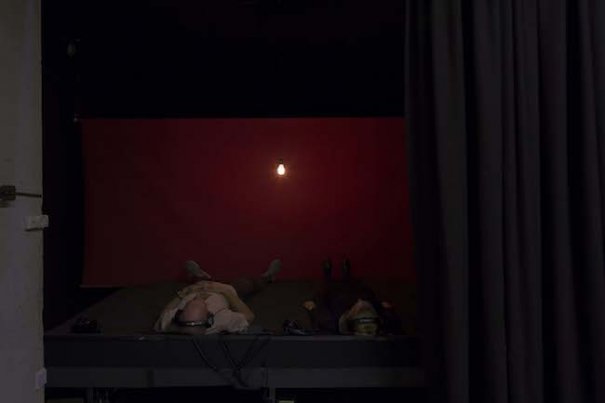Farkost2014
Our ability to imagine things that aren’t in front of us is an important factor in what makes us human, and may even be what distinguishes us from other animals. That the imagination is of fundamental importance for our survival is an indisputable fact. But this power is not something we are born with but something that we can develop and train. Research has shown that babies who do not get enough stimulation and human connection in their first six months find it more difficult to develop the emotional antennae that are so important for humans’ inner imagination.
Lundahl & Seitl’s installation, Farkost (Craft), can be seen as a laboratory for this reasoning – as visitors are prepared for an experience that is largely created by their inner sensations. The installation includes a darkened passage between the gallery and the world outside, through which visitors enter on a moving vessel in a horizontal position. The artists use Farkost to highlight the phenomenological layer of human experience, often more present in dreams, preparing visitors for a different way of experiencing artworks that are not usually shown in traditional gallery spaces. Here, both infants and adults confront the artwork on an equal plane as they are slowly pushed through the darkness, and born into the exhibition. The work can be seen as both a craft and a uterine space capsule.
Farkost was shown in Ursinnen, a group exhibition at Färgfabriken, in cooperation with Artikel 31 and supported by Allmänna arvsfonden.
*
Technology and the Child
Presentations and panel discussion
25 October 2014
Lundahl & Seitl took part in a panel discussion alongside the exhibition of Farkost at Färgfabriken. This open conversation used Lundahl & Seitl’s work as an example, while also being a wider discussion about transdisciplinary research and practice. The panel focused on how an imaginative approach can trigger the design of new technologies that incorporate human qualities of touch and nearness, embodied presence and trust.
Speakers: Ronald Jones, Helena Granström, Christer Lundahl, Martina Seitl & Erica Tanos. Moderator: Mats Bigert.
Highlights:
(1) Presentations by Martina Seitl and Christer Lundahl
(2) Presentation by Helena Granström
(3) Presentation by Erica Tanos
(4) Presentation by Ronald Jones
(5) Answering the question, “What would you say if a transhumanist questioned your activities and said they were unethical?”
(6) Answering the question, “How could you work with experiences in the future if people aren’t having physical experiences anymore, and their experiences were just virtual?”
(7) Answering the question, “Does anyone have a fantastic prognosis for what is often depicted as a dystopic future where children are disconnected from the real world?”
(8) Responding to a visitor describing living in a remote valley in Peru with no access to technology, and posing the question, “Should our children have ‘no screen days’?”
(9) Talking about the hidden agendas of technology companies
(10) Talking about the absence of technology
